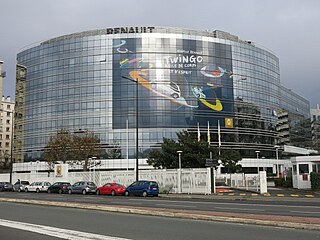
Groupe Renault is a French multinational automobile manufacturer established in 1899. The company produces a range of cars and vans and in the past, has manufactured trucks, tractors, tanks, buses/coaches, aircraft and aircraft engines, and autorail vehicles.

Simca was a French automaker, founded in November 1934 by Fiat S.p.A. and directed from July 1935 to May 1963 by Italian Henri Pigozzi. Simca was affiliated with Fiat and, after Simca bought Ford's French subsidiary, became increasingly controlled by Chrysler. In 1970, Simca became a brand of Chrysler's European business, ending its period as an independent company. Simca disappeared in 1978, when Chrysler divested its European operations to another French automaker, PSA Peugeot Citroën. PSA replaced the Simca brand with Talbot after a short period when some models were badged as Simca-Talbots.

The Peugeot 407 is a large family car (D-segment) produced by the French automaker Peugeot from 2004 to 2011. It was available in saloon, coupé and estate variants, with both diesel and petrol engines. The petrol engines range from 1.8 to 3.0 liters displacement, whereas the diesel engines range from 1.6 to 3.0-liter engines.
Berliet was a French manufacturer of automobiles, buses, trucks and military vehicles among other vehicles based in Vénissieux, outside of Lyon, France. Founded in 1899, and apart from a five-year period from 1944 to 1949 when it was put into 'administration sequestre' it was in private ownership until 1967 when it then became part of Citroën, and subsequently acquired by Renault in 1974 and merged with Saviem into a new Renault Trucks company in 1978. The Berliet marque was phased out by 1980.
Jouef is a French brand and former manufacturing company specialized in scale model railroads. The brand name is currently owned by Hornby.

Heller Hobby GmbH is a French manufacturing company established in 1957 in Paris. Currently headquartered in Radevormwald, Germany, Heller produces plastic scale model kits of cars, aircraft, ships, and military vehicles.

Majorette is a French toy manufacturer which mostly produces small Die-cast scale model cars, commercial vehicles, aircraft, and other vehicles, particularly in 1:64 scale. This is a normal 2.5–3 in (64–76 mm) size, thus Majorette has sometimes been called "the Matchbox of France". Traditionally, production was centered in the urban area of Lyon, but diecast models are now made in China, the Philippines, Taiwan, Thailand and Vietnam.

Solido is a French brand and former manufacturing company of die-cast scale models of cars, military vehicles and commercial vehicles. The models are usually made of zamac alloy in varying scales.

Norev is a French manufacturer of die-cast scale model cars. Traditionally based in Villeurbanne, a suburb of Lyon. It has normally produced modern and vintage European vehicles, especially those of French origin – though Italian, German, British, and American vehicles were also produced. Norev's closest competition was Solido, but that company had more pan-European influence, while Norev was more national in orientation.
Eligor is a brand of collector's diecast model cars and trucks mostly made in 1:43 scale. Models have always been made in France, but the company has gone through several ownership changes. Today, though now focusing on model trucks, Eligor is one of the few diecast modelers still making its vehicles in Europe.
Minialuxe is a French manufacturing company that produces and commercialises plastic scale model cars and trucks. The original Établissements Minialuxe was based in Oyonnax, producing models usually made in 1:43 scale, but some larger 1:32 scale vehicles were also manufactured, for example, a Peugeot 403.

Pilen S.A. was a Spanish manufacturing company headquartered in Ibi, Alicante, which produced die-cast scale model cars from the 1970s through the mid-1990s mostly in 1:43 scale. A majority of the castings were inherited from French Dinky.
France was a pioneer in the automotive industry and is the 11th-largest automobile manufacturer in the world by 2015 unit production and the third-largest in Europe. It had consistently been the 4th-largest from the end of World War II up to 2000. It is 16% of sales of French manufactured products.

Emaux de Briare is a French company specializing today in mosaics. Whilst the manufactory in Briare originally started with earthenware pottery, the factory founded in Paris by Jean-Félix Bapterosses (1813–1885) initially began manufacturing porcelain buttons in 1845. They merged in 1851, at which date its international development started: 1851 in The Great Exhibition, UK and as early as 1853 in the United States.

RCI Banque SA, trading as Mobilize Financial Services, is a France-based international company that is a wholly owned subsidiary of Renault and part of Renault's Mobilize unit. RCI Banque specialises in automotive financing, insurance, and related activities for the Renault group brands globally for the Nissan group brands in Europe, Russia, Asia and South America; and for Mitsubishi Motors in the Netherlands.
Société Anonyme de Fabrication d'Injection et de Recherches was a French manufacturing company that produced diecast metal classic veteran and contemporary plastic race cars and other vehicles in the 1960s through the 1970s. It arose out of the previous French toymaker, "Jadali".
Paul-Marie Pons was a French naval engineer who became a senior civil servant. He is remembered for the Pons Plan which restructured the French automotive industry in the second half of the 1940s.

The Château de Trousse-Barrière is a historic manor in Briare, Loiret, Indre-et-Loire, Centre-Val de Loire, France.
Miniaturas Buby was an Argentine company that manufactured die-cast scale model automobiles and trucks. The company, created by Harold Mahler, was notable for having produced scale model replicas of most of the vehicles manufactured in the country during four decades, such as Fiat 600, Renault 12, Ford Falcon, Citroen 3cv, Renault Fuego, Peugeot 504, among many others.











